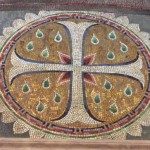Picked this up from Julie at Happy Catholic and I must say I really do agree with this assessment of the Latin Mass:
I don’t think I’ll be making regular trips back. The distance, while inconvenient, isn’t a real factor. I wouldn’t mind making the drive once a month, or even more often, if I thought it necessary. But, I don’t. First of all, I am completely accustomed to the Novus Ordo, and my parish, for all its flaws, doesn’t have flagrant liturgical abuses. I’d imagine I could get used to it, but just reading along, with little interaction, and not even being able to hear much of what was going on, does not engage me. While I do agree that the priest should be oriented in the same direction as the people, not facing them, to project audibly more of the prayers cannot be a bad thing. While I also agree that the English translation used in the Novus Ordo is in places abysmal, I honestly fail to see how English faithful to the Latin is inferior to Latin. The liturgies of the Eastern Catholic Churches are almost all in the vernacular, yet haven’t lost an ounce of reverence or beauty. English isn’t the problem; liberal translation hell-bent on desacralizing the Mass is.
As I sit here trying to sort out my mixed thoughts, I keep coming back to one thing: that there is nothing intrinsic to the Novus Ordo that keeps it from being as reverent as the Tridentine Mass. If we fixed the pitiful translation to clear up some theological problems, turned the priest around, got rid of sappy music…we’d end up with a pretty reverent Mass, and one in which everyone could be engaged. I’d even be fine with making those changes gradually in order to ease the transition and not drive away another generation of those wedded to a particular rite, this time the Novus Ordo.
I concur. Actually, I’ve always maintained that the mass they televise on EWTN, sometimes, would do the trick for me, meaning, fix the deplorable translations from the Latin, turn the priest back around and sprinkle a LITTLE Latin into it, for the Agnus Die, the Pater Noster and the Kyrie (okay, that’s Greek) because there is something really nice and reverent and grounded in using those prayers…but let’s not go back to the days where the priest mumbled the mass and you barely heard him.











